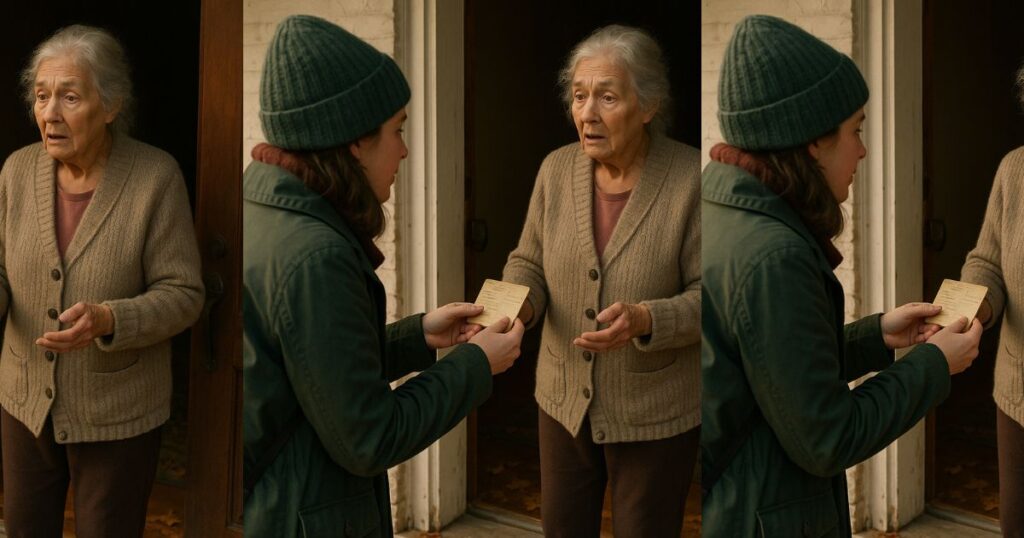Part 2: The Name in the Corner
She didn’t say much after that.
Just sat there, tracing the rim of her mug with one finger, her eyes flitting between me and the card in my hand like she wasn’t sure which of us might disappear first.
“I didn’t think you’d remember me,” Lena said softly.
“I didn’t. Not at first,” I admitted. “But it’s funny, isn’t it? Some kids blur together — the noisy ones, the ones who came in only for the air conditioning. But there were always a few who… stayed. Quietly. Like they were listening harder than the others.”
She smiled. “That was me.”
“Yes,” I nodded. “That was you.”
After she left, I didn’t turn on the TV like I usually do in the evenings. Didn’t check the news, didn’t bother with Wheel of Fortune. Instead, I sat at my kitchen table long after the tea had gone cold, the card still in my palm like a living thing.
It had creases down the middle and a small ink blot in the corner — the kind that came from one of those temperamental ballpoint pens we used to keep in the front drawer at the desk. My signature was still visible, curled and a little shaky, even back then.
M. Ellis.
For some reason, seeing it made my chest ache in a way I hadn’t felt since the day I locked the library for the last time.
I got up and climbed the stairs.
The attic was a mess — boxes, holiday decorations, old quilts. And under a stack of brittle yearbooks and teaching newsletters, I found it.
The ledger.
Not a formal one. Just a thick, navy blue notebook with cracked binding and yellowing pages. I’d started it sometime in the late ’80s, when the computers were still slow and clunky and the official records didn’t seem to capture what really mattered.
Inside were names. Hundreds of them.
Darnell – loves trucks and asks if dragons are real
Emily C. – cries when books end, always wants more
Sarah Nguyen – wrote her own ending to The Boxcar Children
It wasn’t official, it wasn’t required, but it was mine. It was memory. Not just who borrowed what, but who they were.
I turned a few pages in and there she was.
Lena Harper – very quiet, always reading. Asked if books could be friends. I said yes. She smiled.
I sat there in the dim glow of the attic bulb, my hand over her name, and cried.
Not the kind of crying you do when something breaks. The kind you do when something is finally seen.
Lena came back a week later.
She brought cookies — homemade, still warm — and a copy of The Firefly Girl with a note inside just for me.
Dear Mrs. Ellis,
This is the book I would’ve wanted to find on your shelf at age nine. It’s about a girl who feels invisible, until she meets a woman who knows that stories are survival. You taught me that. I hope this reminds you what you built — even if they turned it into a gym.
With love,
Lena
We sat on the porch this time. The wind had turned cooler, brushing the trees with a whisper of coming winter. I wore the old cardigan with the leather elbow patches — the one the kids used to call my “professor sweater.”
“I came back here last year,” she said. “I peeked into the old building before they replaced the front windows. Everything was gone — the beanbags, the globe, even the fish tank.”
I chuckled. “That fish tank leaked for twenty years. I patched it more than the pipes in my house.”
She laughed. “I remember! You named the goldfish Charlotte.”
“After Charlotte’s Web, of course.”
“She died the same week I lost my first tooth.”
“I cried harder over the fish.”
We both smiled at that.
“Do you still have books?” she asked.
“Too many,” I said, pointing toward the den. “The shelves are full, and the closet in the hallway is worse. I’ve donated so many, but they just seem to multiply.”
“Can I see them?”
“Help yourself.”
She disappeared inside for a moment, then came back holding a weathered copy of Anne of Green Gables, the spine barely intact.
“This was it,” she said, her voice hushed. “This is the book you read to me. I remember your voice — how soft it got when Anne was scared, how it lifted when she was dreaming.”
I took the book in my hands. Pages loose, the paper soft like cloth. My initials were still on the inside cover.
“You know,” I said, “there were days I wondered if any of it mattered. When funding got cut, when parents stopped coming, when the computers took over — I wondered if I had spent four decades babysitting for free.”
“You didn’t,” Lena said. “You gave us a place. And you didn’t ask for anything back.”
She stayed past sunset. I made grilled cheese and tomato soup, and we ate on the porch as the crickets started up their night music.
“You know,” she said between bites, “there’s something strange about growing up. When you’re little, the world feels huge, but your people — the adults who shape you — seem permanent. Like they’ll always be there.”
“And then?” I asked.
“And then you leave. Life happens. And you realize those people… they disappear unless you go back. Unless you remember.”
She looked at me carefully.
“I came back, Mrs. Ellis. Because I remembered.”
And again, I had no words. Just a heart so full it ached.


